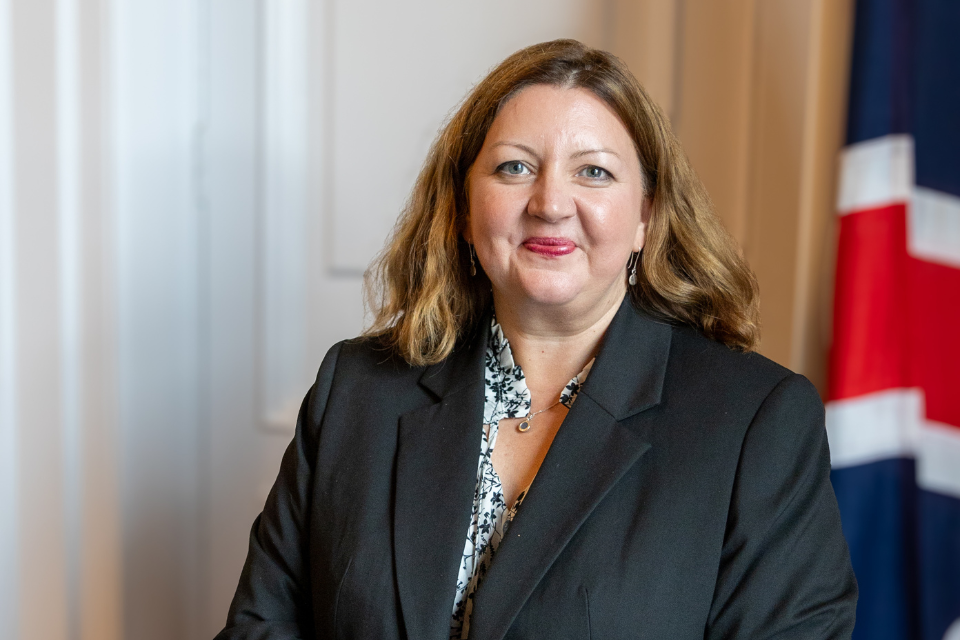Good morning everyone, thank you for inviting me to be here with you today. I’d like to thank Martin Kennedy for that kind introduction and congratulate him for his work in leading the NFUS as he finishes his term as your President.
I’d also like to start with a huge thanks for your dedicated work in continuing to produce, gather and distribute top quality food across the whole of the UK. But more than that, thank you to all farmers and crofters for the central role you play in our national life and heritage in Scotland.
Despite countless challenges – not least the famous Scottish climate – farmers continue to work tirelessly, day after day, to feed the United Kingdom, and further afield.
And be in no doubt, the UK Government will continue to do our part in supporting Scottish farmers and crofters, who form such a central part of our rural and island communities.
Of course, the majority of environmental policy is devolved, with agriculture policy fully devolved. We will continue to respect the devolution settlement and strengthen relations with the Scottish Government as part of our ongoing resetting of relations.
But there is much we can and are doing for farming and rural communities more broadly through our Plan for Change to turbo-charge economic growth and deliver a decade of national renewal and opportunity for all.
Now, let’s be real. I know what you want to ask me about today. And I know that you’re angry. So I’m not going to shy away from a conversation about APR. But I do want to contextualise it. It’s the job of the NFU to make the case for your members. And it’s the job of the UK Government to listen, yes, but to also take a broad and long term view, balancing competing perspectives.
And the facts are these. The UK Government’s Autumn Budget last year delivered the largest settlement for the Scottish Government in the history of devolution.
The Chancellor announced on 30 October an additional £1.5 billion for the Scottish Government to spend in this financial year, and an additional £3.4 billion in the next.
The Scottish Government will be able to allocate this record funding to devolved areas, including agriculture and rural communities. And that does mean your interests will be weighed alongside other devolved policy areas – that’s devolution in action. But I hope you will also see the benefit to your members of this record investment we’ve made available for Scotland’s public services. Because you know better than anyone that our farming communities are too often the ones with the worst access to NHS services. Public transport is sparse or non-existent. Cuts to schools and local services often hit your families harder than those in our big cities. I’m proud of this investment into the Scottish Government and I hope you will come to be too.
And where policy is reserved, such as in relation to immigration or international trade, we will help support the industry through continuous engagement and development of policy. This is how devolution should work, and we are determined that it does.
Our new Food Strategy will deliver clear long-term outcomes that create a healthier, fairer, and more resilient food system. We will work together with the Scottish government to complement the progress that they have already made in this area.
Russia’s illegal invasion of Ukraine sent shock waves across the global supply chain, and the price of fertilisers and energy bills skyrocketed. That is one reason why we have launched our Clean Power 2030 Action Plan. By sprinting towards clean, homegrown energy, we will protect our energy security from international shocks, create thousands of good quality jobs, tackle climate change and drive down bills for good.
We are taking some bold steps, including by setting up Great British Energy. This new, homegrown energy company – headquartered here in Scotland – will provide a catalyst for new, clean energy projects across the UK.
Unpredictable weather has been causing floods and droughts as the climate continues to change, directly impacting crop production and, consequently, your profits. This hits particularly hard in areas that are less favourable for farming, and there are many of these in Scotland.
This industry is resilient. I am in awe of everyone in this room who contributes to our food security, our rural and island communities and the growth of the UK economy. But let me make one thing clear – this Government does not take your resilience and adaptability for granted.
My own constituency of Midlothian is dotted with farms and farmers, many of whom I have had the pleasure of meeting both as I campaigned, and in my first proud months as their representative in Parliament.
I know that there is no substitute for meeting people in the places they live and work, on their terms. I have carried this principle into my first months as a Minister in the Scotland Office. On one of my very first ministerial visits last year I met with Lucy and Pete Grewar, who own Sheriffton Farm in Perthshire.
I was there to discuss their challenges in finding staff to help pick their broccoli, and made a promise to come back with a Home Office ministerial colleague to visit Scotland to hear about these issues directly. I was thrilled that we were able to do that earlier this week when alongside NFUS representatives, Seema Malhotra, the Minister for Migration and Citizenship, and I visited a soft fruit farm in Aberdeenshire.
Whilst on the farm, Seema and I had further discussion with the owners and NFUS about the Seasonal Workers; Visa scheme and how labour shortages impact their work, but also the need to drive economic growth and encourage domestic workers to take up these vital jobs.
I also had similarly frank and productive conversations with crofters on the Isle of Lewis. We will continue to engage with you, and I will continue to invite my UK Government colleagues to come up to Scotland and hear directly from rural communities what they need.
I value every single one of these visits as it gives me the opportunity to really hear from the people who are directly impacted by Government policy, and who also help us achieve our goals of food security, sustainability, Net Zero, economic growth, and countless others.
And I just want to reassure you that I really listen in these conversations and I do, personally, read everything that I am sent in follow up. So if you have evidence you want me to read, stories you want me to hear or places you want me to visit I give you my word: you will always get a hearing from me. Just be in touch.
Now there are four areas of UK Government policy that I want to focus on in the time I have left.
Firstly, inheritance tax.
This Government was forced to make many difficult decisions when it came into power due to our own challenging inheritance of the £22 billion financial black hole in public finances left by the previous Conservative administration.
We could have just ignored it. We could have kicked the problem down the road. But when we stood for election we promised to take the hard choices head on. We needed to act.
I know many of you in this room don’t agree with how we responded and feel let down. So I want you to hear in my own words, as someone who represents farmers right across my own constituency, why the Government made this decision.
Under the current system, APR and BPR have granted 100% relief since 1992 on business and agricultural assets. However, this is heavily skewed towards the very wealthiest landowners and business owners.
According to the latest data from HMRC, 40% of agricultural property relief is claimed by just 7% of UK estates making claims. That means that just 117 estates across the UK were claiming over £200 million of relief in 2021-22.
Unfortunately, we also know that the reality today is that buying agricultural land is one of the most well-known ways to avoid inheritance tax.
This has artificially inflated the price of farmland, locking younger farmers out of the market.
None of this is either fair or sustainable. That is why we are reforming how agricultural and business property relief work. From April 2026, relief will be targeted in a way that still maintains significant tax relief while supporting the public finances, and protecting working people.
I would like to thank Martin and his colleagues at NFUS for their helpful engagement with myself and the Secretary of State for Scotland, Ian Murray, on this issue. I am grateful for the dialogue we have had and will continue to have.
We have had a disagreement, not a falling out – a difference of opinion on one question should not – must not – prevent us from talking about all the others. And talking is what we will continue to do. We will continue to engage with stakeholders in meetings like this and on farms, and we will continue to strengthen relations with the Scottish Government, respecting the fact that agriculture policy is devolved.
That’s why in the coming months the Scotland Office will host a food and farming roundtable where we will invite the industry and the Scottish Government to sit together and discuss these important issues. This will allow us to keep these conversations going.
Now I would like to further address the devolved agriculture budget.
I appreciate the vital role Scottish agriculture plays in rural communities and the economy in Scotland. The Secretary of State for Scotland wrote to the Defra Minister for Rural Affairs and Food Security outlining this prior to the Autumn Budget.
And at the Budget, Defra announced the biggest budget for sustainable food production and nature recovery in history. This included £620m for Scotland for 2025-2026, baselined from last year. This is an above-population share, and the ringfence was removed to respect the devolution settlement – meaning it is for the Scottish Government to determine how they support farmers and rural communities with the public services they rely on.
But we did not stop there. We wanted to address the issues rural communities face holistically – and the Autumn Budget delivered on that.
The fuel duty freeze extension means that rural communities who depend on cars, vans and tractors will be able to save more of their income.
The Budget also gave the go ahead for rural growth deals in Scotland, such as for Argyll and Bute, creating hundreds of jobs and countless opportunities for rural and island communities there.
We recognise how important it is for rural areas, especially in Scotland, to have the same broadband connectivity and opportunities as the rest of the UK, so we announced in the Budget last year an additional £500 million for Project Gigabit and the Shared Rural Network.
Next I would like to touch on seasonal workers, referred to earlier.
While we are not currently considering a Scotland-only visa, this Government knows how important securing the right workforce is to the agri-food chain. This includes skilled jobs such as butchers and vets and temporary roles, such as seasonal horticulture harvesting and poultry processing jobs.
Underlining the government’s commitment to the horticultural and poultry industry, the Seasonal Worker visa route has been confirmed for 2025, with a total of 43,000 Seasonal Worker visas available for horticulture and 2,000 for poultry next year.
This will help the sector secure the labour and skills needed to bring high quality British produce, including strawberries, rhubarb, turkey and daffodils to market.
In addition, Defra published the 2023 Seasonal Workers Survey report on 21 October 2024.
The survey showed that the vast majority of respondents reported a positive experience from their time in the UK and 95% expressed a desire to return. This excellent feedback reflects so well on farmers and the vibrancy of rural communities.
When I visited a Perthshire farm weeks into office, the clearest thing I heard was that Scotland’s farmers wanted a hearing at the Home Office – I promised then that I’d try to bring a Home Office minister to Scotland to hear from farmers directly and that’s a promise kept. Just two days ago I was in a farm in Aberdeenshire with Seema Malhotra, the immigration minister, hearing about how seasonal worker rules could be made to work better for you. The door is always open and so are our minds – we want an ongoing relationship with a practical focus on getting things done.
-And finally, just let me say something on future trade deals.
Supporting farmers will always be a priority for this Government. We have been clear we will protect farmers from being undercut by low welfare and low standards in trade deals.
We will continue to maintain our existing high standards for animal Health and food hygiene, ensuring that imported products comply with our domestic standards and import requirements.
We are committed to developing a trade strategy that will support economic growth and promote the highest standards of food production.
The UK has a network of sixteen agrifood and drink attachés around the world who break down market access barriers, create new export opportunities and protect existing trade. Our attachés work closely with Scottish Development International’s global network on delivering market access / export opportunities for Scotland.
Promoting Scotland internationally through initiatives such as Brand Scotland – a new initiative led by my department backed by three quarters of a million pounds of funding – is a priority for this Government, and these export opportunities are an excellent way to do that.
In addition, we will seek to negotiate a Sanitary and Phytosanitary agreement with the EU to reduce trade frictions, boost trade and deliver significant benefits on both sides.
I want to reiterate my commitment to you that this Government will do everything it can to support you, listen to you and advocate for you, to ensure we not only protect but also maximise the potential of this incredible industry.
Let me end by saying that it has been the honour of my life to serve as MP of Midlothian since July of last year, so I am here today telling you that I will fight for you as a Minister, but I also understand the views of my constituents. Many of them have the same concerns as you.
Many of them are either farmers themselves, or live in a rural community where farming is a crucial backbone.
And I want to assure you I understand your importance is more than the material benefits you bring – important though that is. Alongside farming, tourism and heritage are also in my portfolio. I treasure Scotland’s vibrant national museums, and the National Museum of Rural Life is no different – it’s a beautiful, living tribute to Scottish farming and rural life.
Every time I visit, I can feel the importance of farming to the Scottish identity. I know that all you want is to be able to do what you are good at, what you love.
It is my duty and that of this Government to ensure you have everything you need to do that, to protect your place in this extremely important endeavour. I promise you we will not let you down. It’s just too important.
I am going to take a few questions now. Thank you to NFUS for inviting me here today, and to all of you for coming along. I wish you the very best for the rest of your conference.






